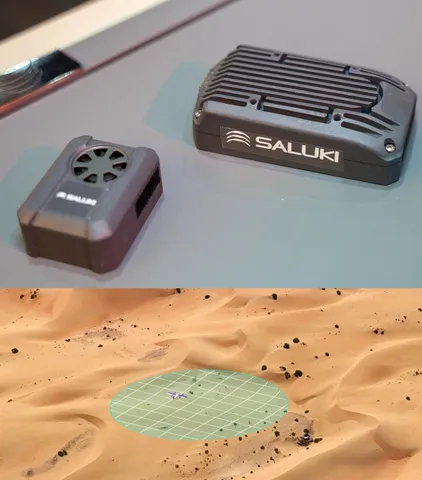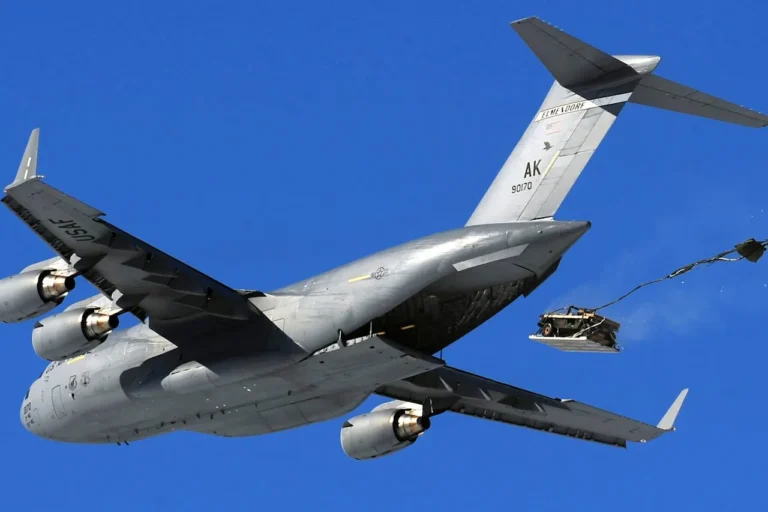
UAE Unveils GPS-Free Navigation for Enhanced Aviation Security
As dual-use technologies increasingly drive economies of scale worldwide, ADASI, a leader in UAV system manufacturing, has announced the adoption of two advanced autonomous flight technologies developed by Abu Dhabi’s VentureOne: Perceptra and Saluki. Perceptra is a cutting-edge GPS-less navigation system, while Saluki is a high-security flight control technology designed for autonomous systems.
Both technologies were developed by the Technology Innovation Institute (TII) and are aimed at ensuring secure, resilient operations in even the most challenging environments. Optimized for UAV manufacturers, these innovations enhance resilience, precision, and security in autonomous aerial operations. The agreement between VentureOne, ADASI, and TII was formalized at IDEX 2025, the Middle East’s largest defense exhibition, where the two technologies were officially unveiled.
The Global Positioning System (GPS) has long been a fundamental pillar of navigation, underpinning applications ranging from daily smartphone use to critical defense and military operations. However, reliance on GPS introduces vulnerabilities, as the technology is susceptible to interference, including jamming and spoofing. Jamming occurs when signals on the same frequency overwhelm GPS receivers, preventing accurate location tracking. Spoofing, on the other hand, involves transmitting counterfeit signals that deceive receivers into calculating incorrect positions or times. These vulnerabilities pose significant risks to sectors that rely on precise navigation, including autonomous drones, commercial aviation, and military aircraft.
In the defense and security sectors, compromised GPS signals can affect mission success and personnel safety. Within aviation, navigation errors may lead to flight path deviations and operational disruptions, raising concerns among international regulators such as the International Air Transport Association (IATA) and the European Union Aviation Safety Agency (EASA). A Reuters report from 2024 highlighted the aviation industry’s growing concern over GPS interference and the urgent need for alternative navigation solutions.

For autonomous systems like drones and self-driving vehicles, the inability to maintain accurate positioning can create safety hazards, particularly in dynamic or high-risk environments. As GPS-dependent systems continue to expand, there is an increasing demand for resilient, alternative navigation solutions. Perceptra and Saluki address these challenges through advanced vision-based navigation, providing reliable and resilient performance even in contested environments.
Dr. Najwa Aaraj, CEO of TII, emphasized the significance of these innovations: “Perceptra, with its GPS-less capabilities, and Saluki, with its sophisticated Zero Trust architecture, represent a significant leap in autonomous navigation with the potential to transform multiple sectors. From supporting safe travel in commercial flights and search-and-rescue missions to enabling efficient urban drone logistics in densely populated cities, these technologies have broad real-world applications. Their adaptability also makes them invaluable in defense, ensuring secure and resilient operations even in the most challenging environments. This collaboration reflects our commitment to developing advanced, dual-use technologies that serve both civilian and defense needs while positioning the UAE as a leader in next-generation autonomous systems.”
Perceptra is a vision-based navigation system that enables UAVs and other autonomous aerial platforms to operate in GNSS-denied environments. It features visual relocking capabilities, low navigation errors, and seamless integration across multiple platforms. This technology is particularly beneficial for intelligence, surveillance, reconnaissance (ISR), and electronic warfare applications, where reliable navigation is critical.
Saluki, on the other hand, is a secure, high-performance flight controller and mission computer designed with Zero Trust architecture. With PX4 compatibility, generative AI capabilities, and 300 TOPS compute power, it supports multi-vehicle management in mission-critical defense applications. These features enable autonomous systems to operate securely and efficiently, even in highly contested environments.
“At ADASI, we integrate only the most advanced, field-proven technologies to ensure our UAVs operate with unmatched precision, resilience, and security, even in the most contested environments,” said Juma Al Kaabi, the CEO of ADASI. “Perceptra and Saluki provide exactly what next-generation UAVs require: secure, GPS-independent navigation and AI-powered mission control.”
Reda Nidhakou, the Acting CEO of VentureOne, echoed this sentiment: “VentureOne is dedicated to ensuring that cutting-edge research becomes reality to make a positive impact and transform industries. Saluki and Perceptra are just two of many new innovations to come that will help ensure more resilient and safer drone operations across different sectors, starting with defense. We are working on a more comprehensive air autonomy and security portfolio that will play a central role in future drone operations.”
Beyond UAV applications, these technologies have significant implications for the future of aviation security and urban air mobility. Last week, TII announced its collaboration with the General Civil Aviation Authority (GCAA) to support regulatory efforts aimed at developing advanced methodologies for air corridor design. These methodologies seek to optimize flight routes and reduce the risk of aerial incidents in complex urban airspaces, ensuring safe and efficient navigation for both piloted and autonomous drone taxis. By integrating Perceptra and Saluki into airspace management solutions, Abu Dhabi continues to position itself as a global leader in next-generation navigation and AI-powered autonomy.
Both VentureOne and TII operate under the Advanced Technology Research Council (ATRC), which oversees Abu Dhabi’s research and development ecosystem to advance transformative technologies with global impact. ADASI, in turn, is part of the EDGE Group, a leading advanced technology and defense conglomerate. Through strategic partnerships and technological innovations, these organizations are shaping the future of autonomous systems, strengthening aviation security, and reinforcing the UAE’s position as a pioneer in cutting-edge aerospace technologies.
As GPS-related vulnerabilities continue to pose risks worldwide, the introduction of Perceptra and Saluki represents a significant step toward ensuring more resilient, secure, and efficient autonomous flight operations. With continued investments in dual-use technology development, the UAE is poised to play a leading role in the evolution of next-generation navigation systems, redefining the future of aviation and defense security.




